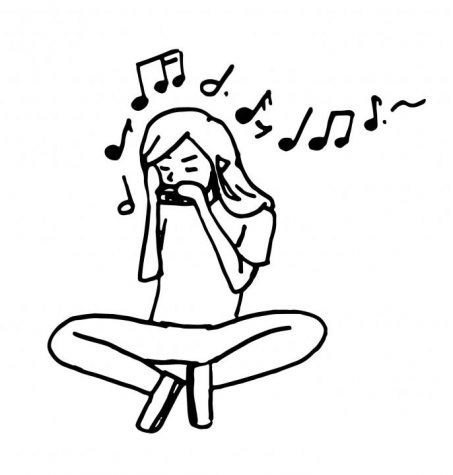Why learning music should matter
March 15, 2019
A lot of people I know have looked back on learning the recorder in fifth grade, and they’ve wondered why we all had that unit in the first place.
It turns out, the reason why is because learning an instrument increases your mental capabilities across the board.
Studies have demonstrated that learning about music, be it purely theoretical or actually playing an instrument, helps tremendously with cognitive skills like reasoning and planning. These skills transcend musical abilities and can help you across the board in terms of academics.
Non-musicians may claim they don’t have the time or money to learn an instrument despite the positive effects. However, everything—from algebra to cross country—takes time and money to learn. Why, then, do so many people consider music to be a more exclusive group? Perhaps they believe it takes more time and more money than other hobbies.
This simply isn’t true. Case in point: the harmonica.
The harmonica is a cheap, easy instrument to learn. I bought one for ten dollars, although a decent quality one can be found for cheaper, and it took me only a few weeks reach a satisfactory skill level.
There are numerous resources to learn every instrument out there, and you can find tutorials on how to play almost any song you might want to learn. These, along with five-minute YouTube lessons, were the bulk of what I used to learn harmonica. Past these, I practiced for only a few minutes a day, doing exercises suggested from the lessons to make my tone better.
Despite how short my practice sessions were, being consistent in my practicing was the major difficulty. As with every other activity, though, having a consistent schedule to practice makes it much easier to develop that skill.
Other instruments are just as easy to learn as the harmonica, even if it might not seem like it. Guitar is offered at Liberty for free, and just having the class reduces the need for consistent practice outside of your usual schedule.
If I could learn an instrument in only a few weeks while losing only a few bucks and ten minutes of my time each day, anyone—even someone who’s never played an instrument before—could learn one just as fast as I did, so long as you commit yourself to learning how to play.
Learning an instrument is a very fulfilling experience, too. Progress you make is very tangible: the first songs you learn will be much easier to play after even a week or two of practice, and this effect gets greater and greater the longer you learn. As long as you can be consistent, the skills you gain won’t disappear, even if you miss a week of practice.
Studies have shown that learning an instrument increases your cognitive skills regardless of how old you are when you start, strengthening parts of your brain that may otherwise be underutilized.
Playing music has been shown to have similar effects as puzzle solving. It helps out coordination between the senses, and appears to improve memory and the connection between the two sides of your brain as well.
There’s also the social aspect; musicians have been shown to have stronger bonds to others than non-musicians. It also reduces rates of stress and depression according to multiple studies.
Playing music is fun, too. Getting together with friends and jamming out is fun, even if none of you are playing particularly well.
If even this sounds like too much of a stretch, learning an instrument is still extremely important to your development, and easier than most people think it is. Music is just as necessary as any other subject, and as such, you should do yourself a favor by buying a harmonica for a few bucks and learning how to play.


